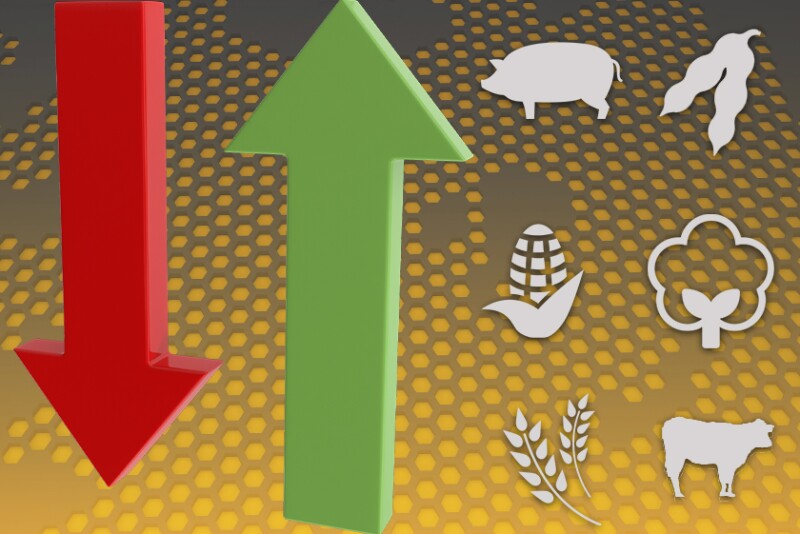GRAIN CALLS
Corn: Steady to 1 cent lower.
Soybeans: 7 to 9 cents higher.
Wheat: HRW and SRW wheat 5 to 9 cents higher, spring wheat steady to 2 cents higher.
GENERAL COMMENTS: Soybean futures extended Tuesday’s gains overnight on strong demand expectations, while wheat climbed behind corrective buying following a drop to 14-month lows. Corn faced light pressure. Malaysian palm oil futures fell 3.1% after the European Union agreed on a new law to prevent companies from selling into its market commodities linked to deforestation. Front-month crude oil was modestly higher. U.S. stock index futures signal a lower open and the U.S. dollar index is down more than 600 points.
China announced today the most sweeping changes to its zero-Covid policy since the pandemic began three years ago. China’s national health authority said asymptomatic Covid cases and people with mild symptoms can quarantine at home. China also dropped testing for people travelling within the country.
Argentina’s weather outlook has changed little, with rain still expected Friday through Monday in central and northern parts of the nation and bringing some temporary relief likely from chronic dryness, but the precipitation may be a little erratic benefiting some areas more than others, World Weather Inc. said. Southwestern Argentina will experience net drying over the next 10 days to possibly for two weeks.
China imported 7.35 MMT of soybeans in November, up 77.5% from October but 14.2% less than last year. Logistics issues with U.S. soybean shipments out of the Gulf and China’s strict Covid restrictions slowed arrivals. Through the first 11 months of 2022, China imported 80.53 MMT of soybeans, down 8.1% from the same period last year.
China’s exports shrank 8.7% in November from a year earlier, the worst performance since February 2020. China’s imports dropped 11% versus last year. the worst since May 2020, and narrowing the trade surplus to $69.84 billion, down from $85.15 billion in October and the lowest since April. China’s trade surplus with the U.S. narrowed to $24.33 billion, down from $34.19 billion in October.
China will auction another 40,000 MT of state-owned wheat reserves on Dec. 14.
China imported 670,000 MT of meat during November, up 6.4% from October but 1.0% less than last year. Through the first 11 months of this year, China imported 6.7 MMT of meat, down 23.2% from the same period last year.
The European Union agreed Tuesday on a new law to prevent companies from selling into the EU market coffee, beef, soy and other commodities linked to deforestation around the world. The law will require companies to produce a due diligence statement showing their supply chains are not contributing to the destruction of forests before they sell goods into the EU, or they could face hefty fines. The law will apply to soy, beef, palm oil, wood, cocoa and coffee, and some derived products.
USDA will publish information on the contracts between meatpackers and cattle producers, including prices paid and amount purchased, in a pilot program aimed at making beef markets more transparent. The Cattle Contracts Library pilot program, which USDA will establish in a rule to be published today, is an effort to help producers figure out how much they should be getting for their cattle.
Effective Jan. 1, 2023, the Pork Checkoff rate will drop a nickel to 35 cents per $100 of value. This change is a result of a resolution passed by voting delegates at the 2022 Pork Industry Forum.
South Korea purchased 65,000 MT of corn expected to be sourced from South America or South Africa and 65,000 MT of optional origin non-GMO soybeans. South Korea also tendered to buy another 25,000 MT of optional origin non-GMO soybeans. Taiwan bought 42,750 MT of U.S. milling wheat and 65,000 MT of Brazilian corn. Japan is seeking 70,000 MT of feed wheat and 40,000 MT of feed barley.
CORN: March corn overnight edged under Tuesday’s low to $6.35, the contract’s lowest intraday price since $6.21 3/4 on Aug. 22. Eroding technicals and soft export demand may keep corn prices on the defensive.
SOYBEANS: January soybeans overnight rose as high as 14.66 3/4 but remained within the previous day’s range. Initial resistance is seen at Tuesday’s high of $14.72 1/2, followed by last week’s high of $14.78 1/2. January soymeal posted a contract high for the second day in a row. Recent export demand from China may keep prices supported.
WHEAT: March SRW wheat traded within the previous day’s range overnight after falling Tuesday to $7.23 1/2, the contract’s lowest intraday price since October 2021.
LIVESTOCK CALLS
CATTLE: Steady-weaker
HOGS: Steady-weaker
CATTLE: Live cattle futures may extend Tuesday’s losses on followthrough technical pressure and a protracted slump in wholesale beef that’s raising demand concerns. Traders started the week anticipating firmer cash cattle prices, but Tuesday’s sharp selloff in futures could derail the bullish hopes. Followthrough selling would likely get hedged feedlots to move cattle at steady/weaker prices, though unhedged feeders may be reluctant to move cattle at lower values since they are current and market-ready supplies are tightening. Wholesale beef remained under pressure, as Choice cutout values fell 66 cents Tuesday to $242.65, the lowest daily average since March 2021. February live cattle plunged $2.20 to $153.625, the contract’s lowest close since Nov. 15.
HOGS: Lean hog futures may face followthrough pressure from a sharply lower close Tuesday as the traders continue to wait for confirmation the cash market is ending a seasonal slide. The CME lean hog index ended an extended price drop with a 15-cent gain to $82.94 today (as of Dec. 5). While this could signal a seasonal low, we would want to see more than one modest daily price gain before making that call. Pork cutout values jumped $3.36 Tuesday to a two-week high at $89.82 on strong movement of 344 loads. February lean hogs tumbled $3.60 on Tuesday to $86.925, the contract’s lowest close since Nov. 30.

